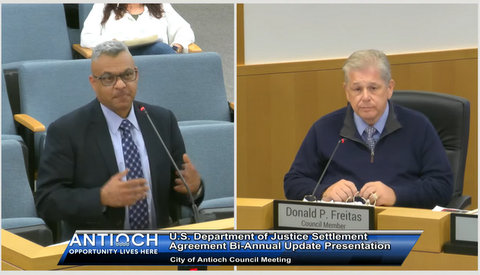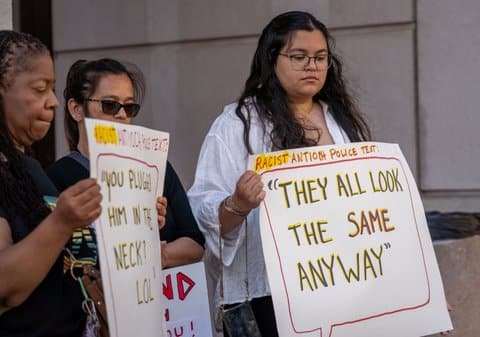
11 Sep Consultant Says Antioch Is Holding Up Its End of DOJ Agreement; One Council Member Isn’t Convinced

“What we’re trying to do here is … build a sustainable culture within the police department,” said Manjit Sappal, left, at Tuesday’s Antioch City Council meeting. “My underlying concern is that the discussions that are happening are between [Sappal], the staff, and not the City Council,” said council member Don Freitas. (Screenshot captured by Samantha Kennedy / The CC Pulse)
By Samantha Kennedy
Antioch is meeting all requirements outlined in its agreement with the U.S. Department of Justice — and a culture change to the city’s police department could be coming “a lot faster than normal,” according to a consultant overseeing the process.
Manjit Sappal’s report, part of an update on the agreement presented at Tuesday’s City Council meeting, comes about a month after council member Don Freitas suggested the city was out of compliance due to missing key deadlines.
“What we’re trying to do here is not just check these boxes off but hopefully build a sustainable culture within the police department. That takes time,” said Sappal, who acts as an impartial party between the city and the DOJ. Sappal is a former police chief in Martinez, captain in Richmond and officer in Pittsburg.
The city has completed three of the eight requirements outlined, but another five are in partial compliance, according to his report. Sappal said some deadlines had to be extended with agreement from the DOJ, and there was “some maneuverability” with the dates.
The agreement resolved an investigation into race discrimination after the discovery of racist and homophobic texts among Antioch police officers and looks to reform department policies and restore public trust.
Council member Monica Wilson said she hoped that, even with the changes Sappal said are happening faster than usual, the best practices would continue after the agreement’s resolution.
“From the very beginning, it was obvious that the department wanted to move in the right direction,” said Sappal. “It’s complicated, there’s a lot of moving pieces … but they’re doing it the right way.”
City Manager Bessie Scott, who was quick to correct Freitas’s comments at the Aug. 12 meeting, stressed the importance of publicly sharing accurate information.
“It’s essential to be clear and transparent when we are doing well and honest about areas where improvement is needed. In this case, we are indeed doing well,” Scott said in an Aug. 18 memo to the City Council and Antioch Police Oversight Commission.
A month after entering into the agreement, Mayor Ron Bernal first publicly shared compliance concerns after a police oversight commissioner’s resignation meant the body had one less member than it was required to have under the agreement.
Bernal backed his concerns by calling for a pause to the commission, which set off now-looming changes to the commission’s independence and divisions between some commissioners and residents.
The commission’s membership requirement, which calls for the commission to ensure at least five of the seven members for the entire duration of the agreement, was not included in Sappal’s report.
So far, Scott said it was her understanding that the department was “indeed satisfied” with the city’s performance. Ahead of the meeting, the DOJ told KQED that it had not issued any notice of alleged non-compliance.
If the city were to officially fall out of compliance, it could be subject to a lawsuit from the department.
“I assume that [the DOJ] would give us some type of deadline, basically an ultimatum, telling us when we have to be in compliance. If we don’t do that, then we would be subjecting ourselves to a lawsuit, which would then likely result in a consent decree,” said Assistant City Attorney Kevin Kundinger.
Freitas said he “rang the bell” after seeing the timeline that had initially been laid out to the council.
“My underlying concern is that the discussions that are happening are between [Sappal], the staff, and not the City Council,” said Freitas. “We’re not privy to that, and ultimately the City Council is the one who has to make sure this is implemented.”
Freitas asked that Sappal keep the council informed on the progress of the agreement to be “proactive” rather than “reactive” later on. But Sappal said, in his role, that is not what he does.
“When things are going awry, the first conversation is with the police chief…If that doesn’t rectify the problem, then the next step would be the city manager and city attorney,” said Sappal. “Does that mean that I insert myself in between? That’s not really my role to do that.”
But Sappal said that he does have the obligation to publicly present an update to the council at least every six months. Updates will be quarterly rather than biannually, according to staff.
“We’re not able to act unless we have the knowledge. That’s the bottom line,” said Freitas.
The current agreement, which can last up to five years, can be terminated once the city has demonstrated two years of sustained substantial compliance with requirements.






No Comments